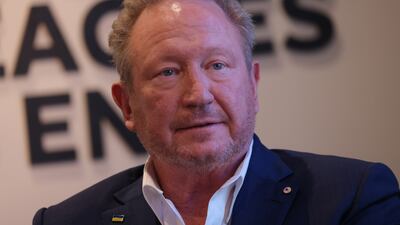Mining magnate Andrew Forrest, Australia’s second-richest man, has called on heavy industrialists such as himself to pivot away from damaging practices that have devastated the planet.
Speaking at Cop28, Mr Forrest challenged the five largest oil and gas companies to phase out fossil fuels in an international campaign urging the industry to act now, as climate negotiations in Dubai entered the final hours.
“The climate has come hard at people in the last six months,” Mr Forrest told The National.
“I don't know what it is going to look like in the future, but it's not going to be pretty.”
Mr Forrest, known as Twiggy, is worth about $26.3 billion according to the Bloomberg Billionaires Index, and built his wealth founding the Fortescue Metals Group mining iron oil for the hugely lucrative Asian markets.
Iron ore exports from Australia to China in 2022 were worth around $76 billion. China is, by far, Australia’s biggest export market for iron ore, the primary source of metal for the world’s construction projects.
“The devastation this [burning of fossil fuels] is causing in the developing world, throughout the tropical world and subtropical world is just so serious that the argument [to phase out fossil fuels] has become completely clear.
“We can no longer say the world doesn't have choices. All the energy the world could ever consume in any possible future paradigm is available – from renewable energy, from harmless green electricity and green hydrogen.”
Mining operations have considerable environmental impact, causing air pollution from diesel generators and water pollution due to acids and heavy metals that drain from mines.
Greener shipping
Since making his fortune, Mr Forrest, has had a mea culpa, becoming an evangelist for renewable energies and a switch away from destructive fossil fuels.
He hopes to transition his own mining operations away from fossil fuels by 2030 and is part of plans to send solar-power generated in Darwin to Singapore via a 4,200km undersea cable.
There are also plans to reduce carbon emissions from the shipping industry, currently responsible for about 3 per cent of the world’s total greenhouse gases.
Mr Forrest has spent millions converting a heavy oil tanker to run on green ammonia.
The Green Pioneer moored in Dubai during Cop28, ahead of its first ammonia-fuelled voyage in February.
“Mining is like energy, it must pivot away from doing [environmental] harm to provide all the world with what it needs, without damaging it,” said Mr Forrest.
“The oil and gas sector will have you believe there is either economic growth [with oil and gas] or nothing. That is just completely wrong.”
Backed by science
Mr Forrest, who is also a marine scientist, recently published an open letter to world leaders stating clear scientific evidence that rising heat and humidity posed a serious threat to humanity, particularly in the tropics.
The document called for the removal of barriers to green industry and fossil fuel subsidies by 2030, and a matching of incentives and disincentives to risk with carbon pricing.
It also called for economic stimulants to encourage green growth and transformation. The letter received support from 60 scientists.
Mr Forrest’s outspoken views, he admits, are an example to other leaders of heavy industry to act now and commit to stop burning fossil fuels, with about three billion people now facing the impact of a changing climate.
“I offer a public invitation to chairmen of the five largest oil and gas companies to join me in a discussion to debate why the phase out of fossil fuels is mandatory,” he said.
“It is fair to expect a constant improvement in our economies, but that must not be done at the expense of obliterating the environment.
“Industrialists of the world must transition towards a zero-harm way of providing energy, manufactured goods and commodities. It is industrialists like me who must change.”


